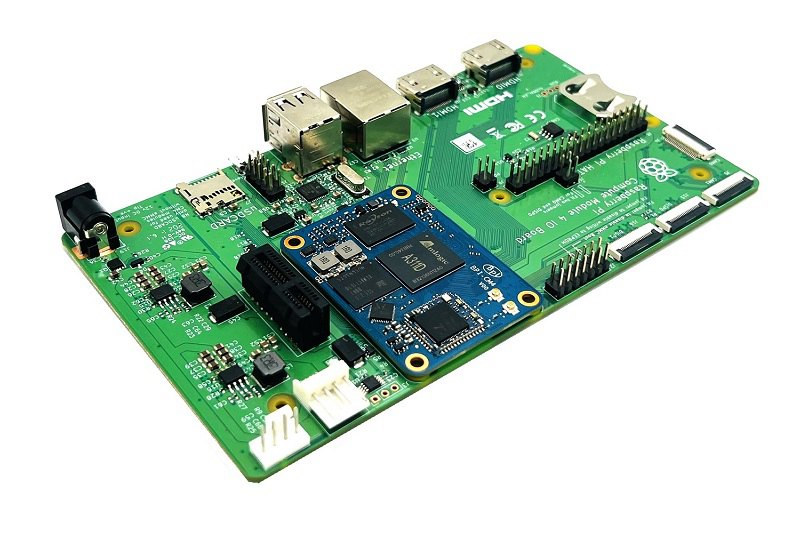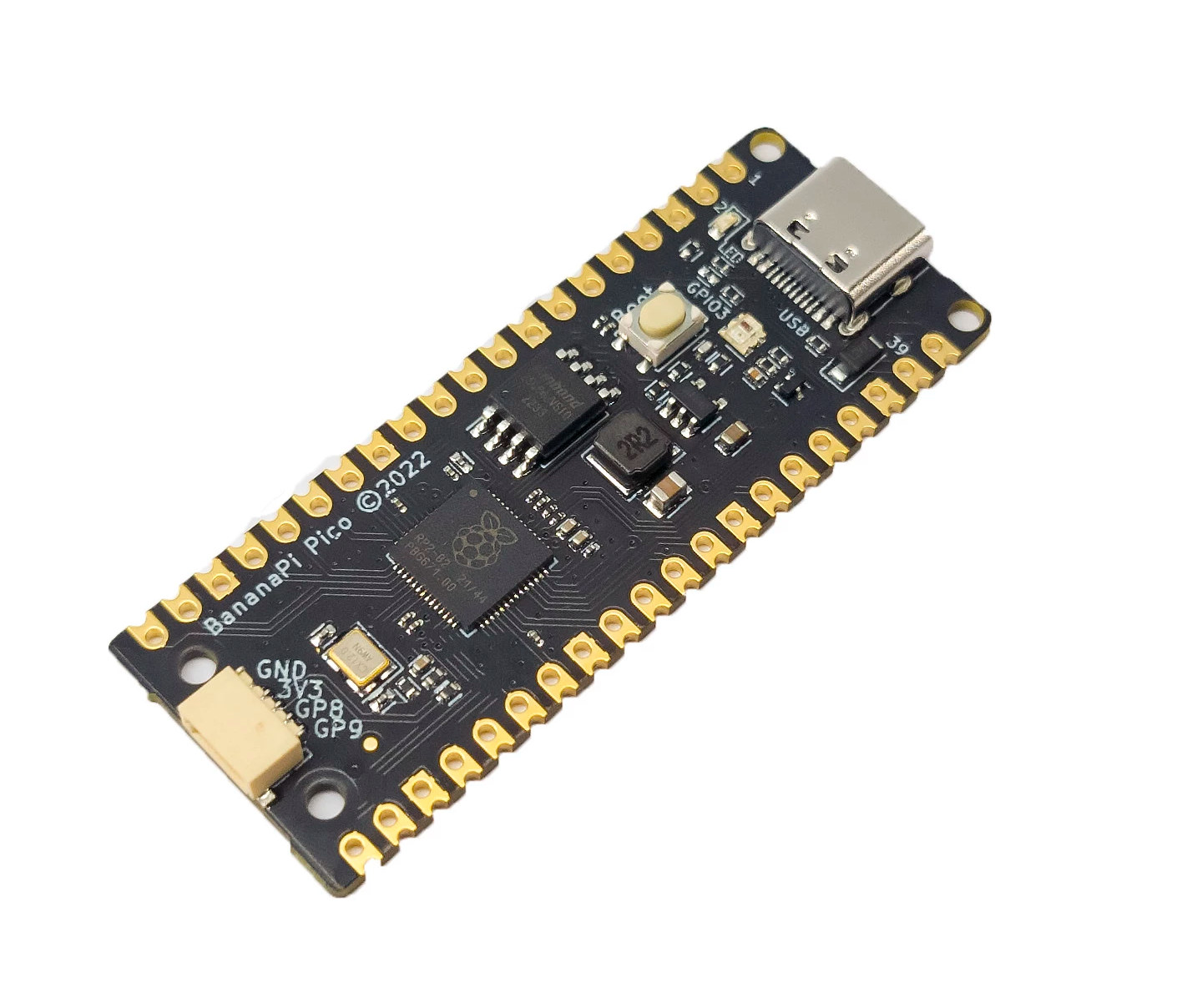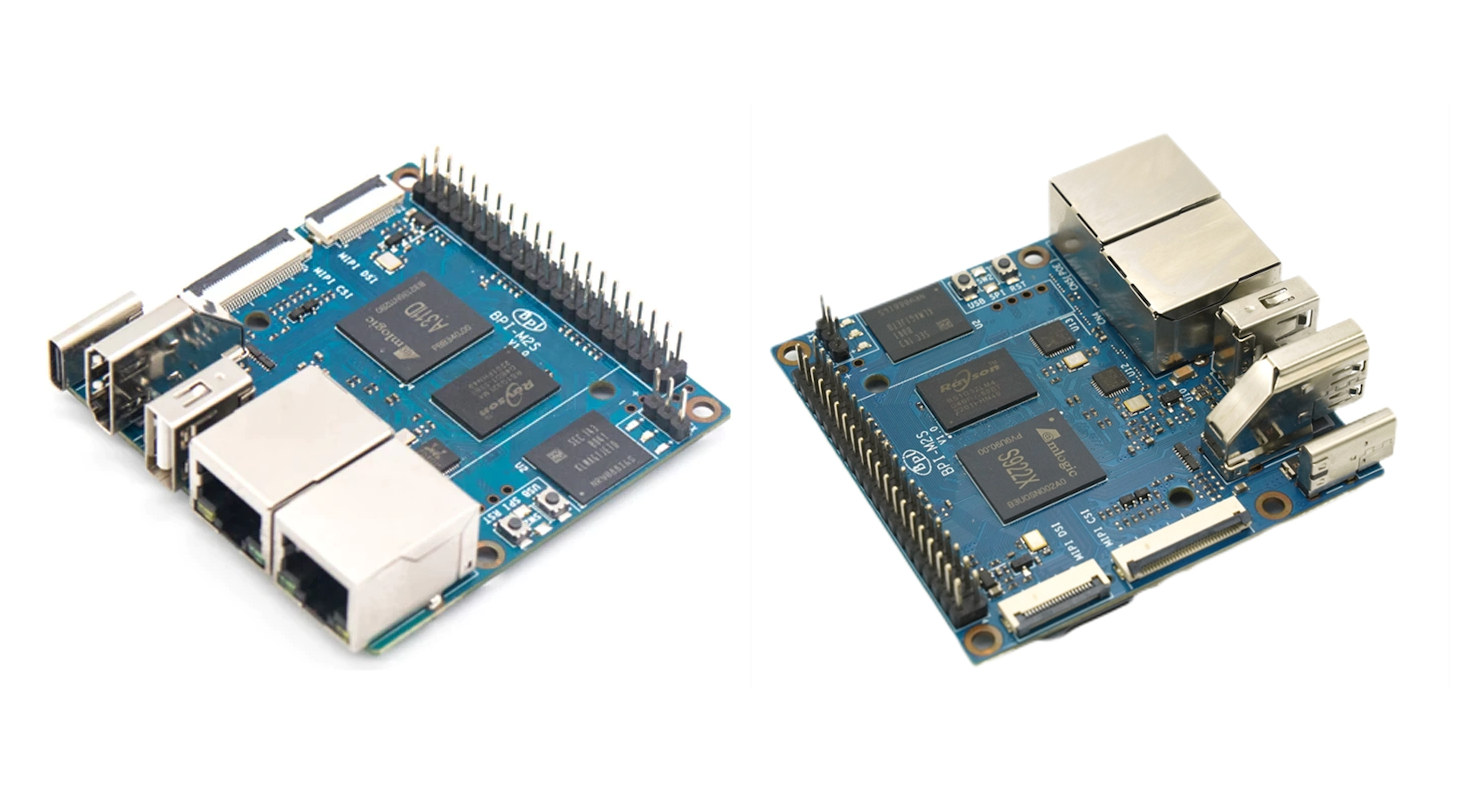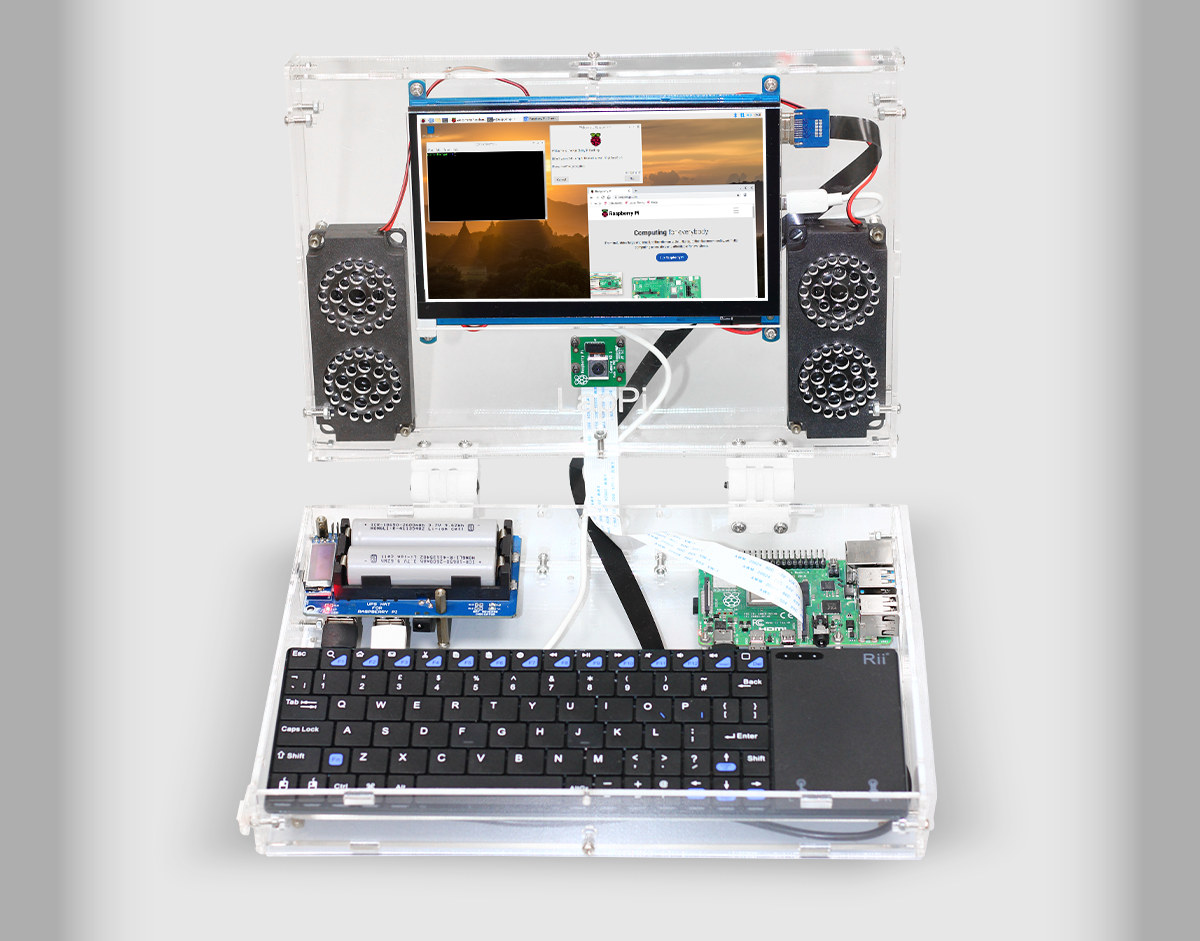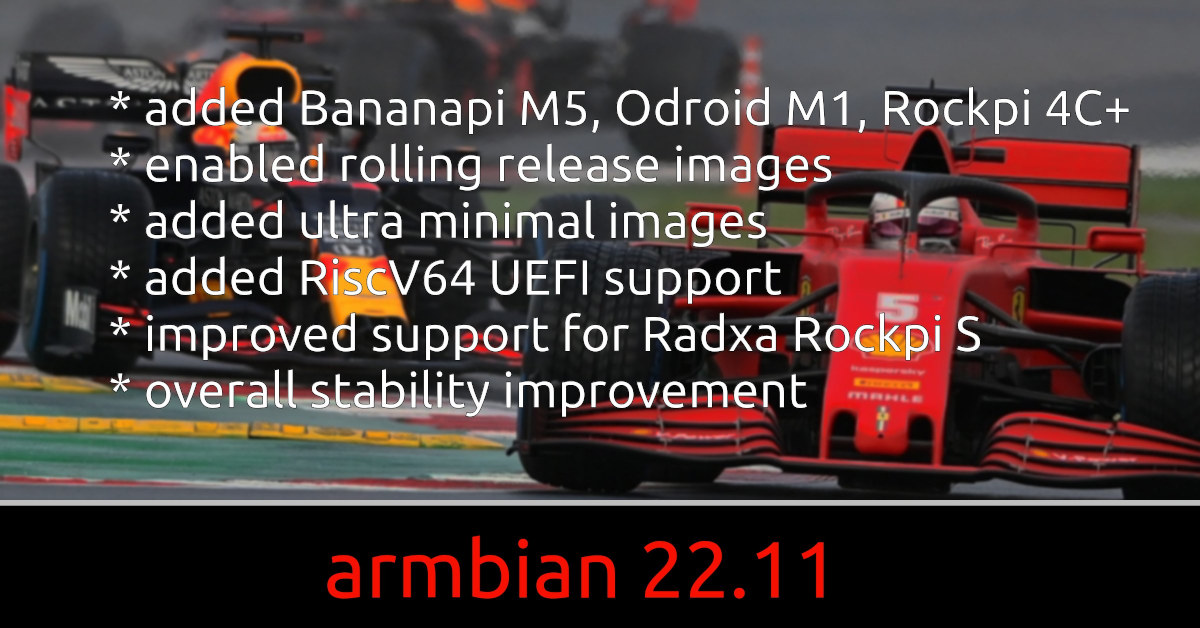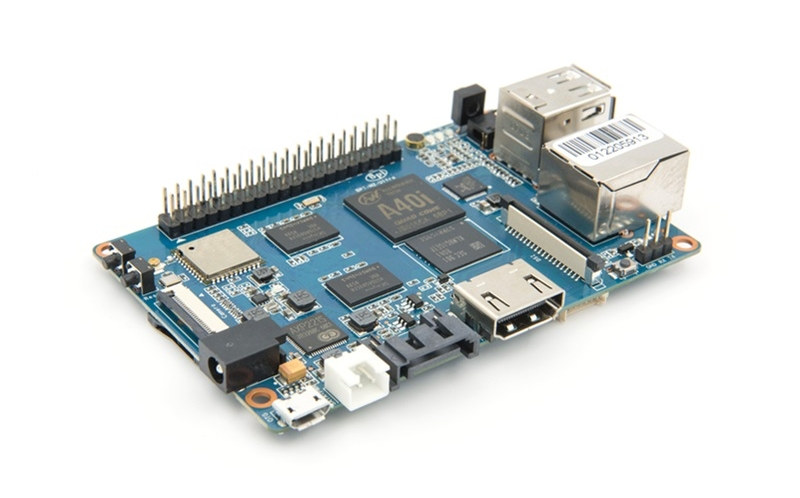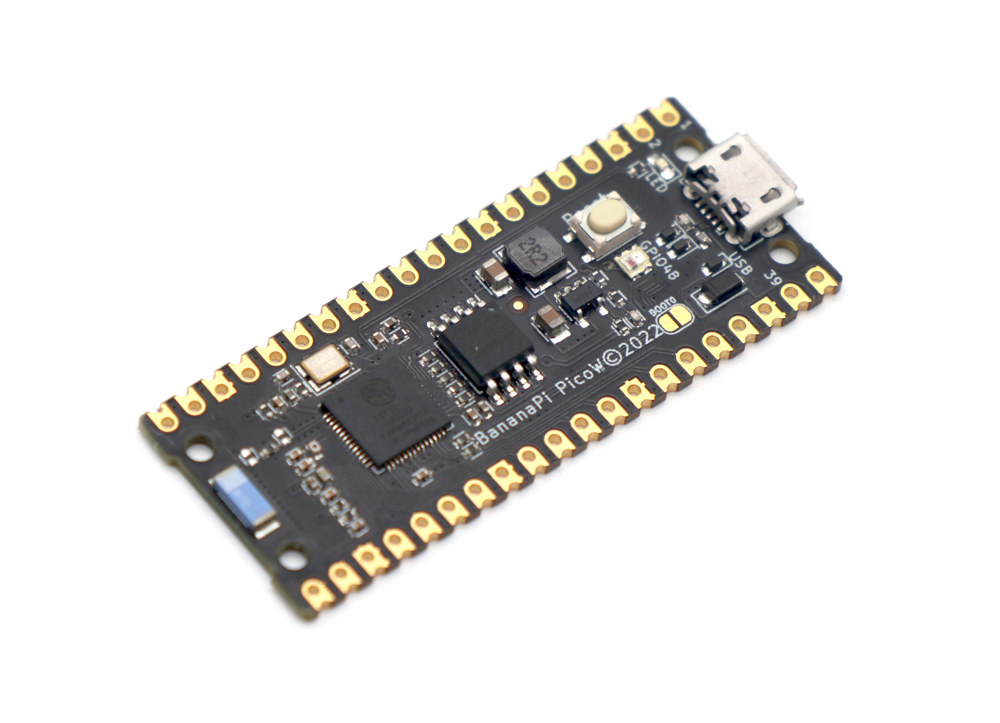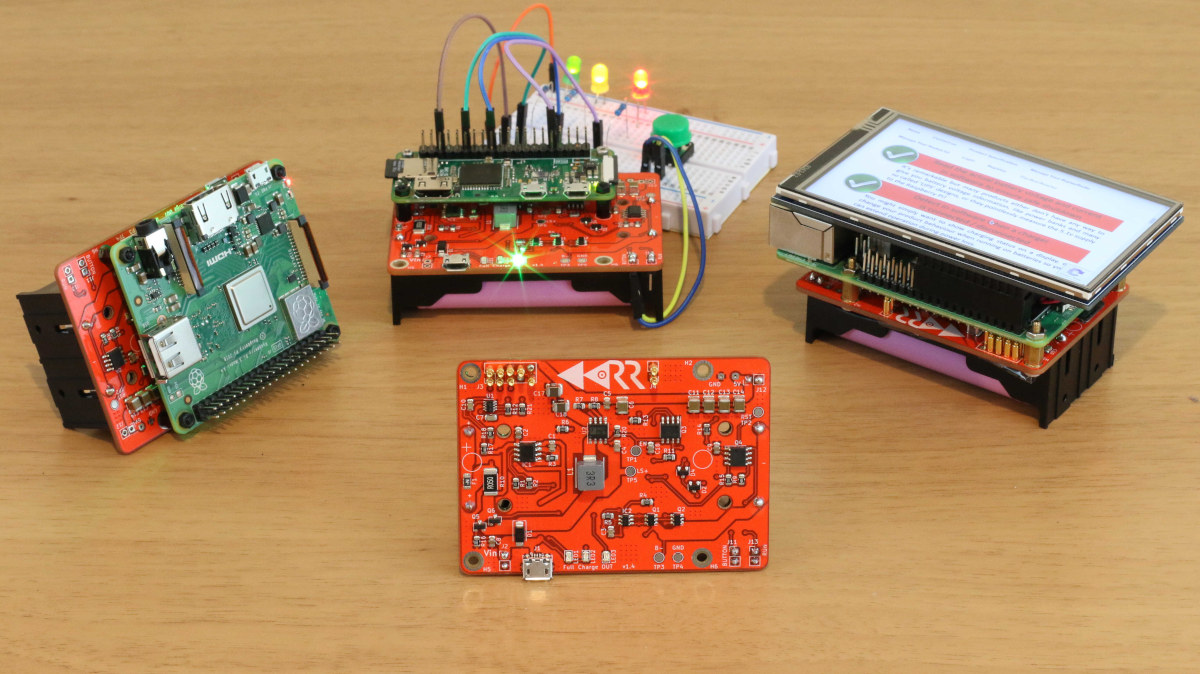Banana Pi BPI-CM4 system-on-module powered by an Amlogic A311D hexa-core Cortex-A73/A53 processor and compatible with the Raspberry Pi CM4 module has now been launched for $95 and up. Banana Pi introduced the Raspberry Pi CM4 compatible module with Amlogic A311D CPU last May with some 3D renders and specifications, and we expected a launch in Q4 2022 or Q1 2023 at the time. The Banana Pi BPI-CM4 is now available together with a carrier board so let’s have another look. Banana Pi BPI-CM4 specifications: SoC – Amlogic A311D hexa-core processor with 4x Arm Cortex-A73 @ 2.0 GHz and 2x Arm Cortex-A53, Arm Mali-G52 MP4 (6EE) GPU, 5 TOPS NPU System Memory – 4GB LPDDR4 RAM Storage – 16GB eMMC flash (up to 128GB) Networking Realtek RTL8211F Gigabit Ethernet PHY on-module Dual-band WiFi 5 up to 867Mbps and Bluetooth 5.2 via Realtek RTL8822CS module and 2x u.FL antenna connectors 2x 100-pin […]
Banana Pi BPI-Pico-RP2040 – Raspberry Pi Pico replica gets USB-C port, I2C connector, and RGB LED
Banana Pi BPI-Pico-RP2040 is basically a clone of the original Raspberry Pi Pico, but with the addition of an RGB LED and a 4-pin I2C connector, and the company replaced the micro USB port with a Type-C connector. The rest of the board, also called Banana Pi Pico, is exactly the same up to the through holes and castellated holes for the I/Os, and has a similar form factor as the Banana Pi BPI-PicoW-S3 that adds WiFi and Bluetooth through the ESP32-S3 wireless microcontroller. Banana Pi BPI-Pico-RP2040 specifications: MCU – Raspberry Pi RP2040 dual-core Cortex-M0+ microcontroller @ up to 133 MHz with 264KB SRAM Storage – 2MB QSPI flash USB – 1x USB 1.1 Type-C port used for power and programming Expansion 2x 20-pin 2.54mm pitch header and castellated holes with 26 GPIOs, 3x 12-bit ADC up to 500 Kbps, 2x UART, 2x I2C, 2x SPI, 16x PWM, 2x programmable […]
$96+ Banana Pi BPI-M2S Amlogic A311D/S922X SBC offers dual GbE, optional PoE and WiFi 5
The Banana Pi PPI-M2S is a single board computer (SBC) powered by either Amlogic A311D or S922X processor with 4GB RAM, 16GB eMMC flash, HDMI 2.1 and MIPI DSI display interfaces, one MIPI CSI camera connector, two Gigabit Ethernet ports with one PoE capable, as well as optional WiFi 5 & Bluetooth support. When we first covered the Banana Pi BPI-M2S over a year ago, all we had were some 3D renders of the board and some preliminary specifications. The company has now manufactured the board, provided some documentation, and started to take orders for the board on Aliexpress for $95.79 or $100 depending on whether Amlogic S922X or A311D is selected. Banana Pi BPI-M2S specifications: SoC – Amlogic A311D or S922X hexa-core processor with 4x Arm Cortex-A73 cores @ 2.21 GHz, 2x Arm Cortex-A53 cores @ 1.8 GHz, Arm Mali-G52 MP4 (6EE) GPU with OpenGL ES 3.2, Vulkan 1.0 […]
LapPi 2.0 – A DIY laptop for Raspberry Pi 4 and other single board computers (Crowdfunding)
The LapPi 2.0 is a DIY laptop kit with an acrylic enclosure, a UPS HAT with a 18650 battery holder, and off-the-shelf parts including speakers, a touchscreen display, a Raspberry Pi camera, and a wireless keyboard that’s suitable for the Raspberry Pi 4 and pretty much any other small single board computer from Radxa, Orange Pi, Banana Pi, FriendlyElec, Hardkernel, and others. We’ve seen several Raspberry Pi laptops over the years with the CrowPi L and Pi-Top, and I have to say the LapPi 2.0 is not the most eye-pleasing or sophisticated design, but at least, it’s versatile and not limited to the Raspberry Pi family. LapPi 2.0 kit content and highlights: Display – 7-inch 5-point capacitive touchscreen IPS display with 1024×600 resolution support for audio output via 3.5mm audio jack and 4-pin header Camera – Official 8MP Raspberry Pi Noir camera with night vision support Audio – 2x 5W/8 […]
Armbian 22.11 released with 64-bit RISC-V UEFI, ultra minimal images support
Armbian 22.11 has just been released with three new SBCs, support for 64-bit RISC-V UEFI, a new ultra-minimal image optimized for software development, and various improvements. Armbian was born as a framework to build better OS images, usually Debian or Ubuntu, for Arm-based single board computers from Orange Pi, Hardkernel (ODROID), FriendlyElec, Banana Pi, and others, but now with the release of Armbian 22.11, support for the RISC-V architecture has started since the system can now generate 64-bit RISC-V UEFI images. Some other highlights of Armbian 22.11 include: Added support for Banana Pi BPI-M5 (Amlogic S905X3), ODROID-M1 (Rockchip RK3568), and Rock Pi 4C Plus (Rockchip RK3399-T) Enabled community images with a weekly release cycle Added ultra minimal images optimized for software deployment Improved support for the Rock Pi S (Rockchip RK3308) Kernel upgrade is frozen by default to improve stability I could not find details about the new “Minimal” images, […]
Banana Pi BPI-M2 Ultra SBC is now offered with Allwinner A40i industrial-grade processor
The Allwinner A40i and A60i industrial-grade quad-core and hexa-core Cortex-A7 processors were first introduced in 2018 with support for the wide -40°C to +85°C industrial temperature range, but so far I had not noticed any hardware making use of either processor. But Banana Pi is now offering the Banana Pi BPI-M2 Ultra SBC, which they launched in 2016 with the Allwinner R40 quad-core Cortex-A7 SoC, with the pin-to-pin and software-compatible Allwinner A40i industrial-grade processor. Banana Pi BPI-M2 Ultra specifications: SoC – Allwinner A40i quad-core Arm Cortex-A7 processor with Arm Mali-400MP2 GPU @ 500 MHz, 1080p60 H.264, MPEG-4, MPEG-1/2 video decoder, H.264 1080p45 video encoder System Memory – 2GB DDR3 SDRAM Storage – 8GB eMMC flash, SATA interface, microSD card slot Video Output HDMI 1.4 port up to 1080p60 4-lane MIPI DSI display connector, or RGB, or LVDS Audio I/O – 3.5mm headphone jack, digital audio output via HDMI, built-in microphone […]
$5.5 Banana Pi BPI-PicoW-S3 ESP32-S3 board follows Raspberry Pi Pico W form factor
Banana Pi’s BPI-PicoW-S3 is a development board following the Raspberry Pi Pico W form factor, but based on Espressif System ESP32-S3 dual-core microcontroller offering both WiFi 4 and Bluetooth LE connectivity. The Raspberry Pi SBCs have inspired many designs, but the Raspberry Pi Pico MCU boards less so. So far, I had only seen the WeAct RP2040 board with the same layout except for a USB Type-C port and a 16MB flash. But the Banana Pi BPI-PicoW-S3 provides a direct alternative to the Raspberry Pi Pico W with a more powerful microcontroller, vector instructions for AI acceleration, BLE, and about the same price at $5.5 plus shipping. Let’s see how the BPI-PicoW-S3 specifications compare to the ones of the Raspberry Pi Pico W in the table below. While the power signal (5V, 3.3V, GND) and GPIO numbers are the same on both boards, there are a few variations here and […]
Add 18650 batteries underneath Raspberry Pi with the Red Reactor board (Crowdfunding)
Pascal Herczog’s Red Reactor is a battery power supply project that adds two 18650 batteries to Raspberry Pi 4, Raspberry Pi 3, or Raspberry Pi Zero board using the pogo pins for connection. The pogo pin method means the Red Reactor is attached underneath the board, as such does not prevent the user to add a HAT expansion board on top of the single board computer. There’s also a headerless version for custom setup or compatibility with boards such as Arduino, Banana Pi, Orange Pi, etc… where some soldering is required. Red Reactor’s key features and specifications: Battery holder for up to 2x flat-top 18650 LiPo batteries Battery voltage and current monitoring over I2C (INA219) for software safe shutdown control, system reset, and your own functions Safety Battery protection Resettable fuse protects against discharge between 2 cells Over-Charge, Over-Discharge, and 6A Over-Current protection Host connection Pogo pins for Raspberry Pi […]


